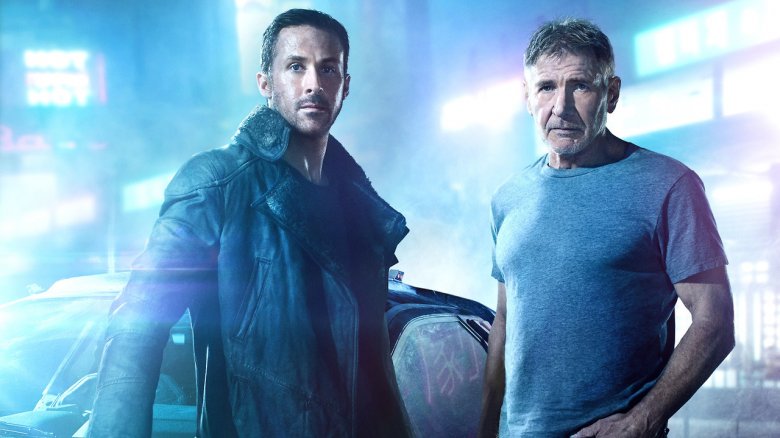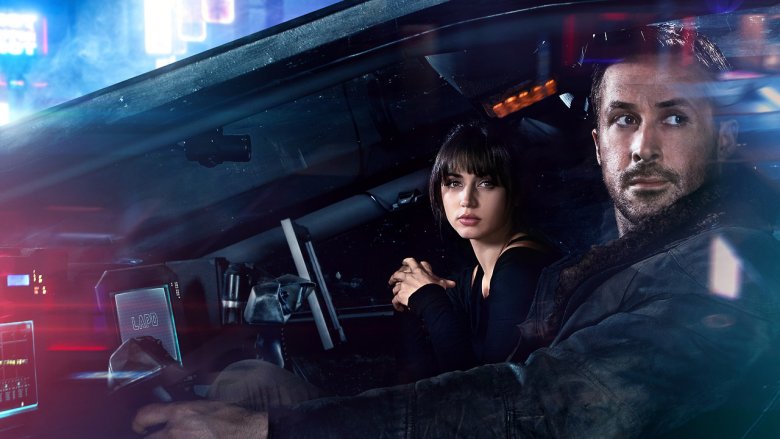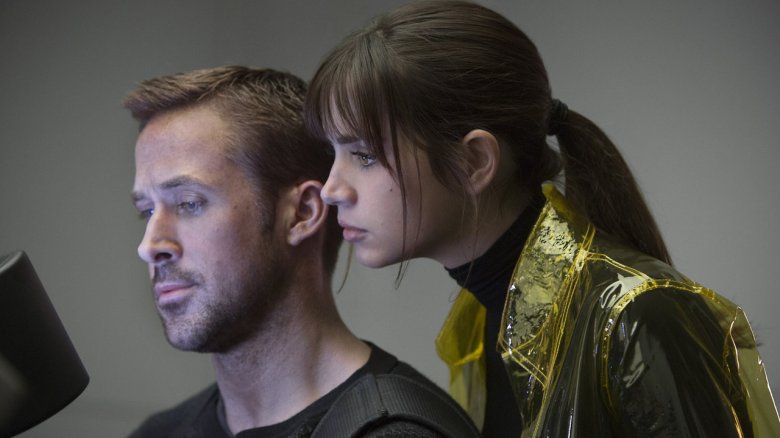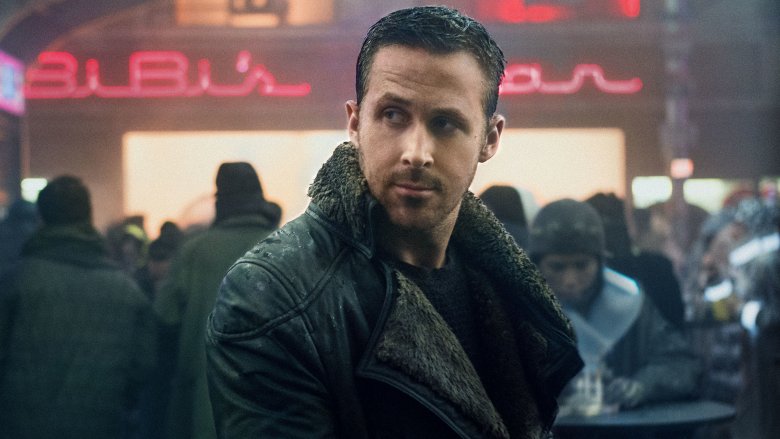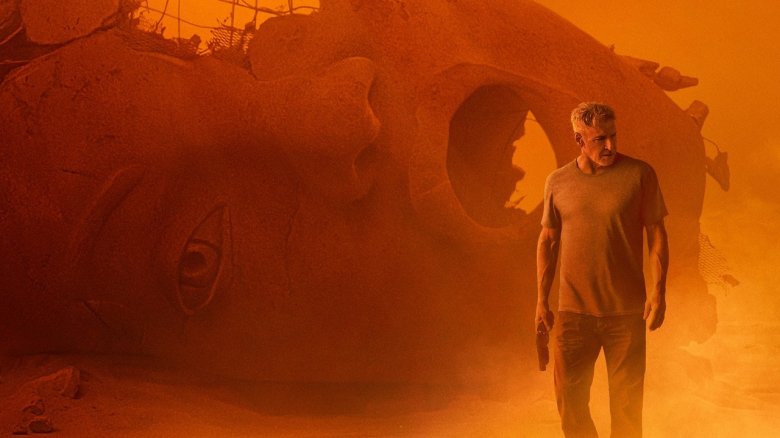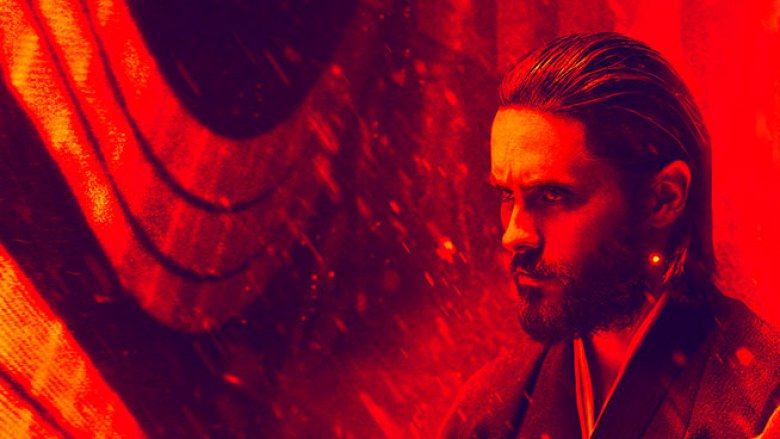Biggest Unanswered Questions In Blade Runner 2049
When Blade Runner came out in 1982, it left fans speechless—but it also left them with a ton of unanswered questions. Thirty-five years later, some of those questions have finally been answered thanks to Blade Runner 2049. That's the good news. The bad news? Blade Runner 2049 has left us with even more mysteries than before. So will we have to wait another three and a half decades to learn the truth? Start your speculation now, because here's a look at the biggest unanswered questions in Blade Runner 2049. Spoilers ahead.
Is Deckard a replicant?
Perhaps the biggest question from the original Blade Runner is whether or not Harrison Ford's character, the replicant hunter Deckard, is himself a replicant. Though Blade Runner suggested that he was, particularly in the director's cut, it was intentionally left ambiguous. Blade Runner 2049 takes that ambiguity and uses it to totally troll the audience, with Jared Leto's replicant magnate Wallace delivering a whole monologue about whether or not Deckard is a replicant without actually answering the question. This is one mystery it looks like we'll never get the answer to.
Did K die?
At the end of the film, K lays down in the snow to die in a beautiful scene clearly meant as a callback to the death of Rutger Gauer's replicant leader Roy Beatty in the original Blade Runner. There's one key difference, though: we see Roy die on camera, while K's fate is left poetically and lyrically, you know, kind of up in the air. Sure, it seems like he dies. He probably is definitely dead. And yet...is he? K takes a severe beating several times in the movie, being shot, stabbed, strangled, drowned, and pummeled severely by several people, yet he somehow manages to just keep on ticking anyway. Would it really surprise anyone if Deckard came back out of that building five minutes later and saved K with some timely medical attention? If there's one thing the Blade Runner films love to do, it's leave things open to interpretation, and K's "death" scene is just another prime example.
What's the deal with Joi?
One of the most enigmatic characters in the movie is Joi, K's computerized virtual girlfriend. Since she was created by Wallace, it's implied that she might be a true AI—after all, that's what the replicants are too in a sense, only in manufactured human bodies. Or maybe she isn't? The mass marketing of identical Joi, right down to calling their partners "Joe," suggests that she might just be a sophisticated program designed to emulate human emotion. Did she really love K, or was she just programmed to act that way?
It matters in part because of the other big question about Joi: why and how did she end up contacting Mariette for that incredibly disturbing sex scene? Was she truly doing it because she wanted to experience sex with K in a physical form? Or was there something else going on with her programming? It's more than coincidence that she happened to contact a member of the replicant resistance who's been ordered to keep tabs on K. Did the resistance somehow hack Joi, or was she programmed to help them all along? It's a little odd that she disappears just long enough for Mariette to put the tracker on K, especially considering she doesn't exactly have anywhere else to go.
All in all, it seems like there's more than meets the eye to Joi. Exactly what, though, is anyone's guess.
Who put Ana's memories in K?
The entire plot hinges on the fact that K has memories leading him to believe he's actually Deckard's son. However, it turns out that though they're real memories, they actually belong to Deckard's daughter, Dr. Ana Stelline, who specializes in creating false memories for replicants. She states pretty clearly that putting real memories in replicants is illegal, but it seems like the only way that memory could have existed is if she created it. Why? And how did her memories end up in K? It seems beyond the scope of coincidence that the blade runner who's investigating the mythical replicant child would happen to have her memories. But who implanted them in K, and why?
When the film opens, K is already on the case, tracking down the first lead—Dave Bautista's replicant farmer Sapper Morton—which breaks open the investigation and starts him down the path that leads to Ana and Deckard. How did he find out about Sapper? Did someone send K specifically to retire Sapper, knowing he had Ana's memories? The movie hints at the idea that K was a decoy meant to lead investigators away from Ana, but if so, boy, did that fail spectacularly!
The more questions you ask about it, the more new questions it creates.
Did Ana know Deckard was her father?
So, about those memories Ana has. She tells K that her parents were ready to go offworld and they left her in this bubble when she got sick at the age of eight. That's clearly a lie, though, because she has memories—which have been implanted in K—about her time living in the orphanage. So what does she really remember, and what does she really know about herself? The replicant rebel leader Freysa tells K she has Deckard's daughter safely hidden away, implying that Ana knows about the rebellion, and thus her own replicant parentage. Plus, she clearly recognizes her own memory when she talks to K. So is she in on it all? Or is Freysa blowing smoke? If the movie had gone on for another ten seconds we would have gotten the answer, but since it didn't, we'll have to settle for just guessing.
What happens next?
At the end of the movie, humanity seems trapped between two different replicant factions. On one hand, Jared Leto's Wallace wants to build replicants who can reproduce, allowing them to colonize the stars. On the other hand, the band of rebels responsible for hiding Deckard's daughter want to rise up and overthrow their masters. If either of these factions prevail, humanity is pretty much doomed regardless. But what does happen? Wallace is still alive with all the resources of the solar system at his disposal. The rebels are off somewhere making new eyepatches for their leader. The whole powderkeg seems about to blow.
Looks like we'll have to wait for Blade Runner 2075 to find out!
